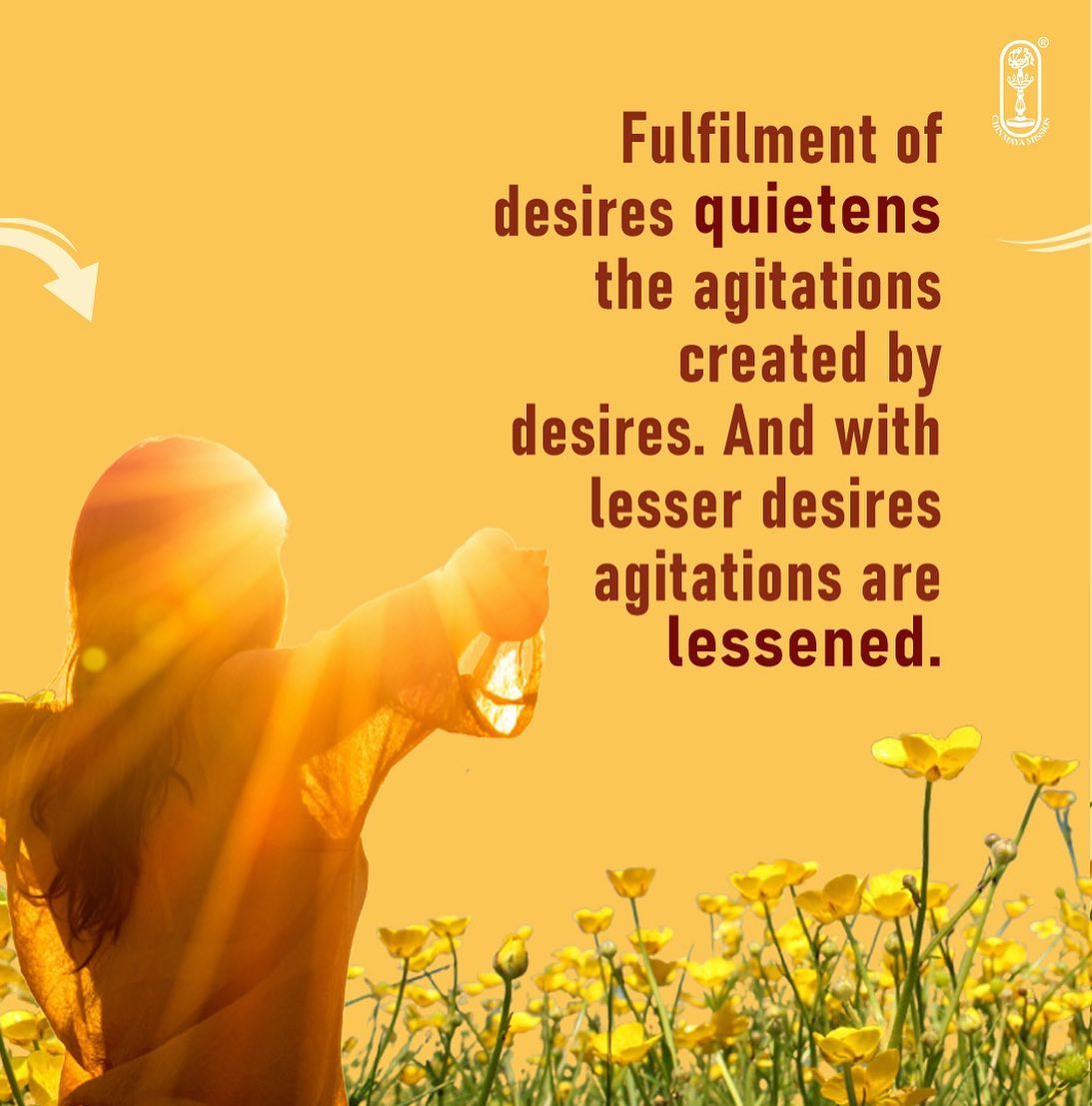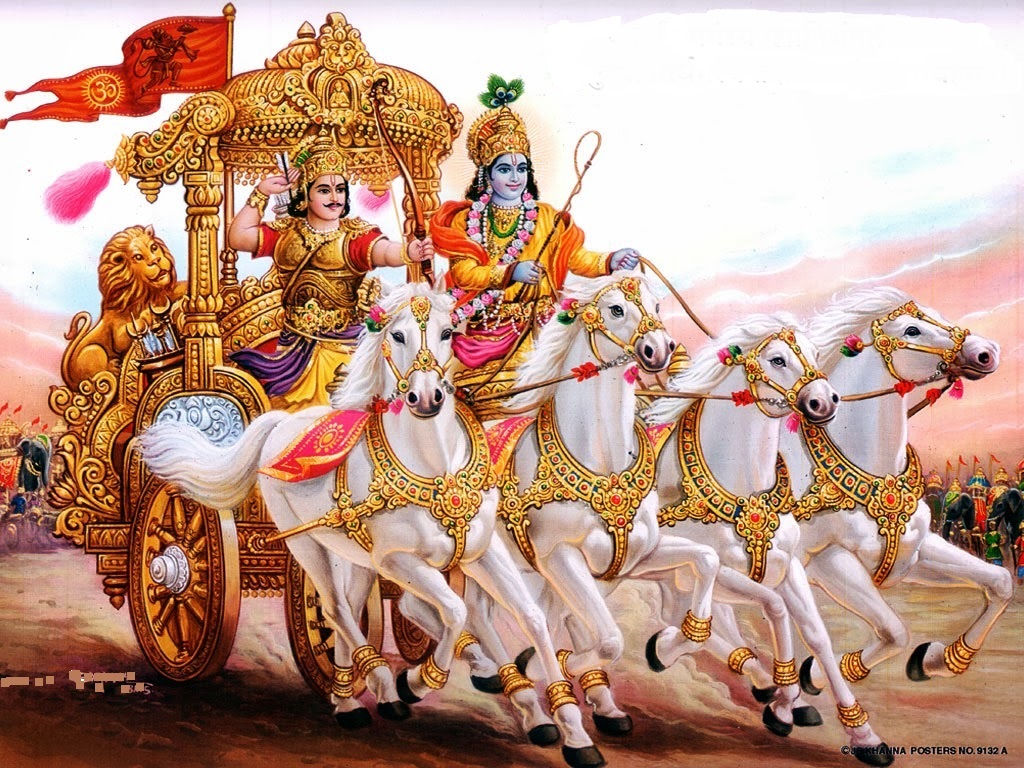The Bhagavadgita – A Synthesis of Thought and Action : 5. Swami Krishnananda.
========================================================================
=======================================================================
Friday, June 03, 2022. 19:00.
(Spoken on Gita Jayanti in 1973)
Post-5.
========================================================================
The Upanishads speak of the ultimate truth of things. Yo vai bhūmā tat sukham: The Plenum is felicity. And what is the Plenum? What is this Bhuma which is the source of real bliss?
yo vai bhuma tatsukham nalpe sukhamasti bhumaiva sukham bhuma tveva vijijnasitavya iti bhumanam bhagavo vijijnasa iti || 7.23.1 ||
Meaning of the mantram :
1. Sanatkumāra said: ‘That which is infinite is the source of happiness. There is no happiness in the finite. Happiness is only in the infinite. But one must try to understand what the infinite is.’ Nārada replied, ‘Sir, I want to clearly understand the infinite’.
Word-for-word explanation:
Yaḥ vai bhūmā, = that which is infinite [lit., big, or the biggest];
tat sukham, = that is happiness;
na alpe sukham asti, = there is no happiness in the finite [small];
bhūmā eva sukham, = happiness is only in the infinite;
bhūmā tu eva vijijñāsitavyaḥ iti, = but one must try to understand the true nature of the infinite;
bhūmānam bhagavaḥ vijijñāse iti, = sir, I want to understand the true nature of the infinite.
Iti trayoviṃśaḥ khaṇḍaḥ,= here ends the twenty-third section.
Commentary:
If you attain bhūmā, then you have real happiness. What is bhūmā? It is Brahman. It is the biggest. It is infinite. Something is infinite when it is without any limitations in terms of time and space. Even our own lives are limited. We were born at a certain point in time and we shall live for a certain span of time. It may be for a hundred years or it may be less, but the body will not last forever.
Then why should we bother about God or Brahman or something that is said to be infinite? Because we want to be happy. Perhaps you are very fond of sweets and enjoy eating them. But when you have finished eating them your joy is gone. Moreover, if you eat too many then you become sick and are miserable. Only in the infinite is there real joy, real happiness, real peace—peace that is constant, always there, and never disturbed. As Sanatkumāra says, ‘Na alpe sukham asti—there is no happiness in that which is small, limited, or short-lived.’
Śaṅkara says, anything that is finite causes tṛṣṇā, thirst—that is, it increases your desire for more. Whatever you get, you desire still more. Suppose you possess the whole world; even then you would not be happy. Therefore that which is finite is duḥkhabījam—the seed of unhappiness.
As long as you are confined to the limited world of sense experience you can never be happy. You have to go beyond sense experience. When you attain the state of bhūmā you feel you have got everything you have ever wanted. As the Gītā says (VI.22): ‘Attaining that, one does not regard anything to be higher.’
-----------------------------------------------------------------------------------------------------------------------
yatra nānyatpaśyati nānyacchṛṇoti nānyadvijānāti sa bhūmātha yatrānyatpaśyatyanyacchṛṇotyanyadvijānāti tadalpaṃ yo vai bhūmā tadamṛtamatha yadalpaṃ tanmartyṃ sa bhagavaḥ kasminpratiṣṭhita iti sve mahimni yadi vā na mahimnīti || 7.24.1 ||
1. Sanatkumāra said: ‘Bhūmā [the infinite] is that in which one sees nothing else, hears nothing else, and knows [i.e., finds] nothing else. But alpa [the finite] is that in which one sees something else, hears something else, and knows something else. That which is infinite is immortal, and that which is finite is mortal.’ Nārada asked, ‘Sir, what does bhūmā rest on?’ Sanatkumāra replied, ‘It rests on its own power—or not even on that power [i.e., it depends on nothing else]’.
Word-for-word explanation:
Yatra, = where;
na anyat paśyati, = one sees nothing else;
na anyat śṛṇoti, = hears nothing else;
na anyat vijānāti,= knows nothing about other things;
saḥ bhūmā, that is bhūmā [the infinite]; atha, but; yatra, = where; anyat paśyati, one sees something else;
anyat śṛṇoti, = hears something else;
anyat vijānāti, = knows of something else;
tat alpam, = that is small [finite];
yaḥ vai bhūmā, = that which is infinite;
tat amṛtam, = that is immortal;
atha, = but;
yat alpam, = that which is finite;
tat martyam = that is mortal;
bhagavaḥ, = sir;
kasmin saḥ pratiṣṭhitaḥ iti, = on what does that [bhūmā] rest;
sve mahimni, = on its own power;
yadi vā na mahimni iti, = or not even on that power.
Commentary:
At the level of bhūmā, the infinite, there is only bhūmā—nothing but bhūmā. And when you attain that level, you see nothing but bhūmā. If you see anything else, then you know at once it is alpa, finite.
Suppose you are alone in a room with a hundred mirrors. What will you see? Only yourself—the same self multiplied a hundred times. But if you attain the state of bhūmā, or Brahman, this is just the experience you will have. You will see yourself everywhere—the same Self in all beings.
We talk of love and compassion, but how can there be love unless there is a feeling of oneness? When you have this feeling of oneness, then if someone is in pain, you are also in pain. True love is possible only when we realize that ‘you’ and ‘I are one and the same. This is the supreme experience.
Once at Dakshineswar two boatmen were having a quarrel and one of them started beating the other. Ramakrishna saw it from a distance and felt as if he were being beaten. Even the marks of the beating were seen on his body. Another day he saw someone walking on some grass, and he felt that the person was stepping on him.
When Ramakrishna had throat cancer he could hardly eat a thing. One day some of his disciples went to him and begged him to ask Mother Kali to cure him. Ramakrishna replied that he could not ask such a thing from her, that he depended totally on her will. But the disciples would not let him alone. They pleaded again and again: ‘Do it for our sake.’ They could not bear to see him suffer.
Finally Ramakrishna agreed to say something to the Mother. When the disciples came back to him later to ask if he had talked to the Mother, Ramakrishna said, ‘I told Mother that I could not eat because of the pain in my throat, and I asked her to allow me to eat something.’ ‘What did she say?’ they asked. Ramakrishna replied: ‘She showed me all of you, and then she said, “But you are eating through so many mouths.” I was ashamed and could not utter another word.’
There is a story about Ganesh and his mother Parvati. Once when Ganesh was playing with a cat, he became very rough and beat it. Later, when he went to his mother, he noticed wounds all over her body. Ganesh was alarmed and asked, ‘Who has beaten you, Mother?’ Parvati replied: ‘Son, you have done this. You beat the cat, but I am also in the cat. If you hurt the cat you hurt me too.’
The Vedāntic idea is that the same Self is everywhere. It is the same consciousness. In some cases that consciousness is more manifest, and in other cases it is less, but it is the same Self permeating everything. From a tiny atom to the whole cosmos, it is all one. The difference is only in the degree of manifestation.
Where there is duality there is conflict, so we must beware of the finite. We must beware of limiting ourselves to our own body. That is the small ‘I’. The body will die, and you think you will die. But if you are one with bhūmā, you are immortal.
Nārada is a very intelligent person. He asks: ‘There is this bhūmā. But who or what supports it?’ Sanatkumāra replies: ‘Bhūmā is self-sufficient. It supports itself. In fact, there is nothing besides bhūmā to speak of supporting or not supporting. There is just one. If there are two things, then only does the question of supporting arise.’
--------------------------------------------------------------------------------------------------------------------------
Where you are not permitted to look on any object as an external something, that is the Supreme Plenum. But where you are drawn down to the level of an individualistic perception of such and such a thing being personally related to you, that is finitude of consciousness. It is not the true nature of things. Satyam eva jayate nānṛtam, satyena panthā vitato deva-yānaḥ, yenākramanty ṛṣayo hy āpta-kāmā yatra tat satyasya paramaṁ nidhānam (Mundaka Upanisahd 3.1.6), says the Upanishad. Truth succeeds; untruth will never succeed. And what is the truth? The Plenum is the truth. And what is the Plenum? Wherein you are not to look upon anything as an isolated something or a disjointed object separated from your own existence, that is the Plenum.
------------------------------------------------------------------------------------------------------------------
If this is the truth, all your pleasures and pains should be untruth. Therefore, Arjuna, pleasure and pain cannot become the standard of judging the rectitude or otherwise of an action. That would be to base the action on a false foundation. You have to base your action on the concept of duty rather than on the concept of pleasure.
---------------------------------------------------------------------------------------------------------------------------
Now, what is duty?
Duty is the obligation that an individual owes to the world outside, and we cannot know what our duty is unless we know what the world is because, as I mentioned in this simple definition of duty, it is an obligation that we owe to the world as a whole.
But how do we know what is our obligation to the world if we do not know what the world is?
The world is not made up of mountains and rivers. It is not a conglomeration of earth, water, fire, air and ether, sun, moon, stars.
The world is a fabric of forces. It is a pattern of energies which work everywhere uniformly both in organic and inorganic substances. We are told today that the universe is made up of energy. It is not made up of substances or things. The world is not made up of things of our taste. The ultimate stuff of the world is something different from the tasty, delightful objects that the senses behold in the structure of space and time. The world is different from what the senses perceive, and therefore we cannot understand the world by merely opening our eyes and seeing it.
The five senses of perception cannot give us an understanding of what the world is made of.
-------------------------------------------------------------------------------------------------------------------------
To be continued .....
========================================================================






Comments